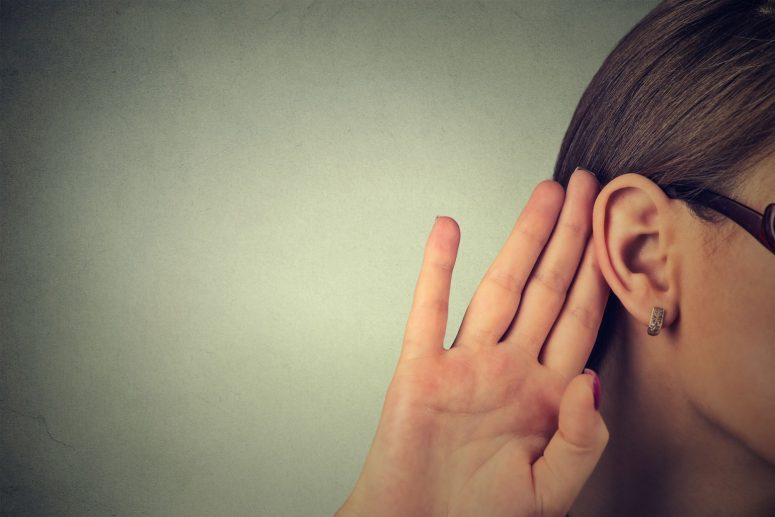
Courtesy Shutterstock
More than half of Americans think crime is getting worse, according to FiveThirtyEight. Truth is: this majority is wrong. Both property and violent crimes have decreased by nearly 75% over the last three decades.
On top of that, everything else is down too, according to Factfulness. Death, poverty, illness, disease—everything. And we can confidently say that without fear of things getting worse if we admit that. Humans get better. Period. We progress and we still will.
Problem is, fear has a nasty way of impeding our progress. For example, “The trouble is that fear about crime isn’t rational, and it’s hard to convince people to think differently about a problem that they don’t experience on a day-to-day basis anyway,” reports FiveThirtyEight. “’You can tell Americans that the crime rate is lower today than it was in the 1990s, but it won’t feel real to them,’ said Kevin Wozniak, a sociologist at the University of Massachusetts Boston. ‘That is, unless politicians stop drumming up the crime rate and people stop hearing about murder every night on the local news.'”
This is especially compounded in middle class and rich countries like America. These types of societies fear more irrational things than others, because they have the luxury of worrying about a lot more stupid things than basic necessities and average wants and needs.
So they worry. They overstate their fears. Then they become victims of that fear.
Coincidentally, we see a lot of similar fears taking hold today about public health. Both are valid concerns, mind you. But I believe both are equally overstated and misunderstood.
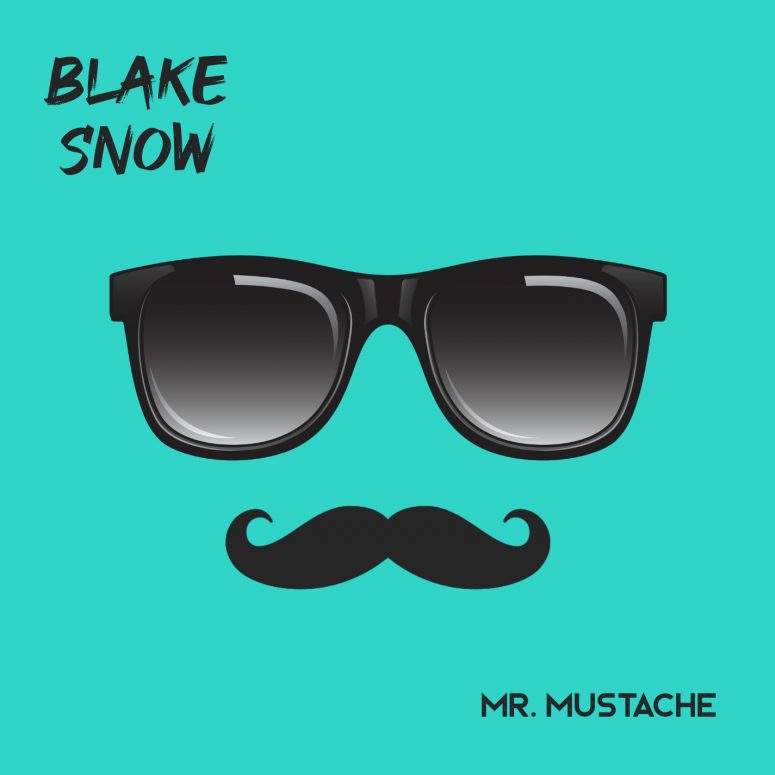
I’m incredibly proud of the album and what it did for me during quarantine. I hope you mark your calendars and enjoy as many songs as possible. Here is the track listing:
- Under Quarantine
- Turn A Corner
- Shrug
- Show Me
- Control What You Can
- Mr. Mustache
- No Longer The Same
- Victim
- Bad Friends
- Time Isn’t Money
- Going Up
- Minuteman
Thanks for giving it a chance. I know it seems weird to have a writer release an album, but I hope you take it as serious as I have. I think you’ll find there are some redeeming, heartfelt songs inside.
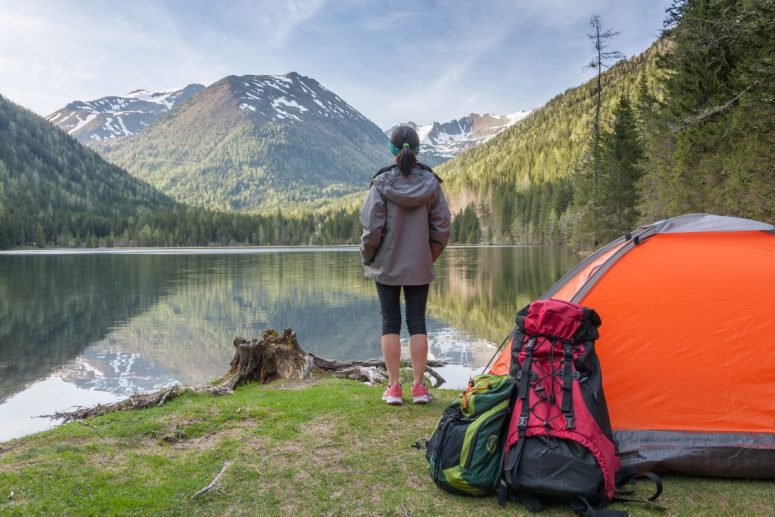
Courtesy Shutterstock
My latest for Orbitz: “In case you didn’t know, there’s been a boom in camping this summer. In wake of COVID quarantines, people are gravitating toward trips and activities that come with built-in social distancing. Camping, of course, is a great option. But packing for either a short- or long-term camping trip involves a lot more than just a tent and smores. Looking to spend a night in the great outdoors? Consider these 17 items before you go.” Continue reading…
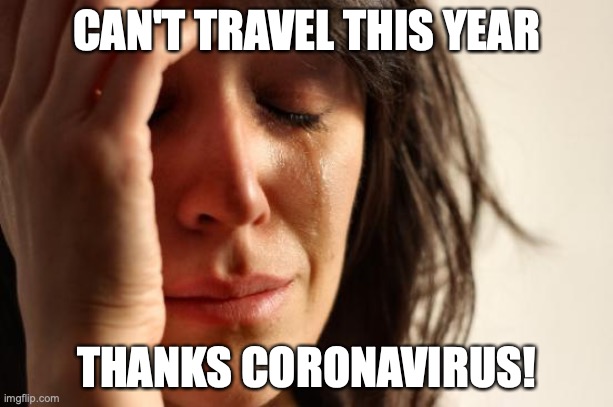
My latest for Lonely Planet: “The past few months have been a challenge for everyone. But for travelers, wanderlusters, and global adventurers, the closed borders and shrinking world have been especially depressing. Here are 10 ways to cope for the foreseeable future, according to experts.”
SEE ALSO: My latest for Orbitz—What your summer vacation will look like this year

Courtesy Boston Globe
This is a great report by Vice on quitting conspiracy theories. From the article:
“These days, Dave lives differently. ‘Mentally, I’m in a much better place. There isn’t a boogeyman around every corner. The mistrust and paranoia is gone. Some of my former compatriots would compare me to Winston Smith at the end of 1984, but that couldn’t be further from the truth. I am able to trust that 2+2=4. Earthquakes happen, people die, stuff happens. There isn’t always a nefarious plot behind it.'”

Like many of you reading this, the last four months have been the most eventful, strangest, and unsettling spring of my life. But it’s also been one of the best (i.e. bonding with family, completing my second book, starting a band).
In that time, I also wrote, produced, sung, and recorded 16 original songs. I just finished the last one this week and just need to make some finishing touches and final mastering before independently releasing the album to Spotify, Apple, and Amazon Music in the coming weeks.
I’m incredibly proud of the result and grateful for it helping me to cope with this fearful new, but still incredibly beautiful world. I can’t wait for you to hear the whole thing.
Until then, here is the “lead single” entitled Turn A Corner.
 If you enjoy the effort of doing something more than the result, you will be good at whatever you decide to do.
If you enjoy the effort of doing something more than the result, you will be good at whatever you decide to do.
In my case, when I spend days, weeks, months, or even years writing something, I love that process more than the minutes, hours, or days it takes me to read the result.
I’m not exaggerating to prove a point. It’s true. I love the act of writing more than the result (although the result is really nice icing on the cake that sustains me to the next result). Asking a lot of people if I can write for them is worth the rejection.
That’s how you know you can “win” at something—because you enjoy the mastery time, effort, and rejection required more than the average person.
In my case, I would write for free, I love it so much. Which is precisely how I started writing, for free, on this blog (and still do). Because I love writing so much, I’ve gotten good enough at it that people will pay me to write for them.
Which is a fulfillment of Joker’s absolutism: “If you’re good at something, never do it for free.”
I’ll disagree with him on the “never” aspect, since you sometimes have to work for free to keep learning and growing. But the point is hard work is valued.
So find work you love doing and the value will take care of itself.
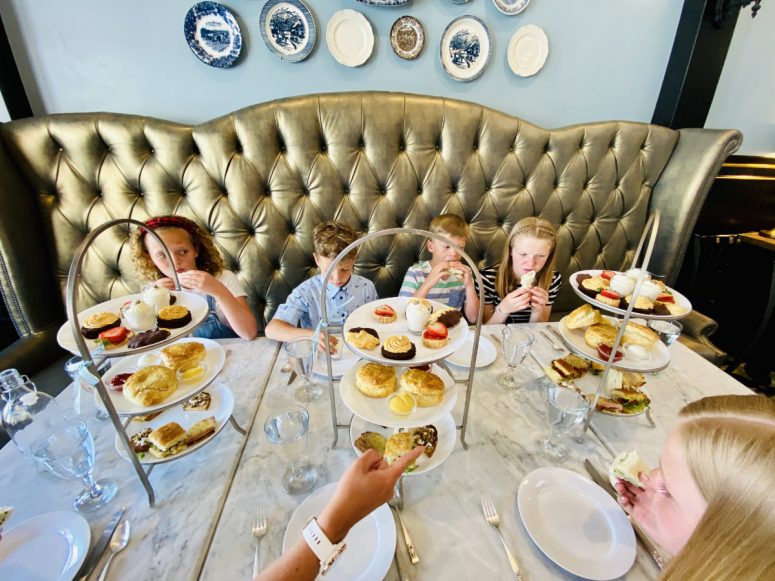
Courtesy Blake Snow
You don’t have to cross borders or cook from home to taste some of the world’s greatest foods. Looking for fresh ideas to spice up your quarantine cuisine? Try one of these, although your mileage may vary depending on current state restrictions: Continue reading…
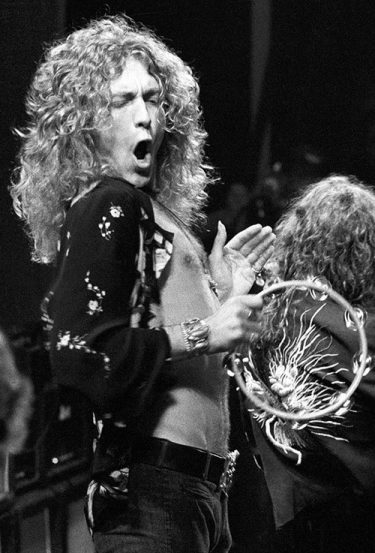 With little else to do in quarantine, I’ve been making a lot of music over the last four months. I’ve recorded an album’s worth of original material, which I hope to release this summer, and started rehearsing with a live cover band—a rock quartet comprised of me singing, Ashton Bennett melting faces on guitar, Caleb Browning rocking a ridiculous amount of bass and backing vocals, and Jayce Ward not missing a beat on drums. (video evidence here)
With little else to do in quarantine, I’ve been making a lot of music over the last four months. I’ve recorded an album’s worth of original material, which I hope to release this summer, and started rehearsing with a live cover band—a rock quartet comprised of me singing, Ashton Bennett melting faces on guitar, Caleb Browning rocking a ridiculous amount of bass and backing vocals, and Jayce Ward not missing a beat on drums. (video evidence here)
Though both experiences, I’ve learned two important lessons:
- I love making music. I learned guitar and started singing in middle school and played in several bands through college. But with notable exception to listening to lots of new music, I largely quit making it after marrying, having children, and taking up writing. Quarantine changed all of that for the better. It’s a wonderful feeling to make harmonious noise while the world slowly sorts itself out.
- Tambourines are in over 50% of popular music. While recording, studying, and performing more live music than ever before, I’ve been immediately struck by the amount of tambourines used in recorded music (at least the kind of pop and rock that I mostly listen to), and how much better they make live music sound. I realize tambourines are the ugly stepchild of music, but let me explain why they’re used more than even synthesizers when it comes to making popular music.
Continue reading…
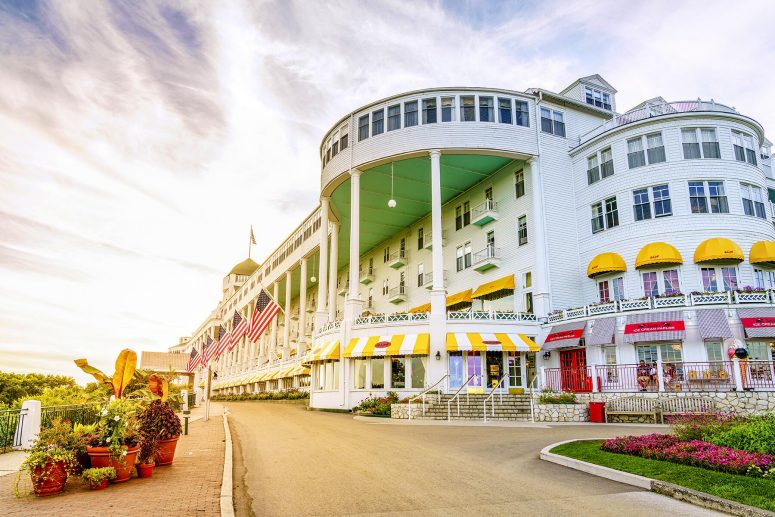
Courtesy Shutterstock
My latest for Fodor’s: Ready or not, the world is starting to reopen to both shoppers and travelers, after more than three months of quarantine. Although international borders are still largely closed, most state borders are open to domestic visitors. Granted, it will take a lot more time and research to pull off a successful interstate trip these days. But for many, the added hassle, increased risks, and fewer options are still worth it. They aren’t perfect. But until further notice, this is as good as it gets. Continue reading…
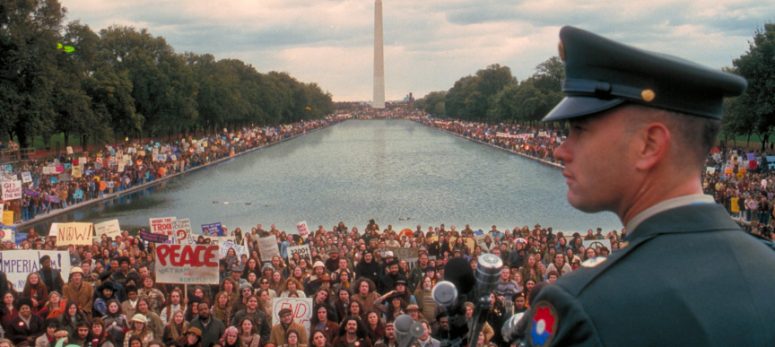
Courtesy Paramount Pictures
Divisive presidents, partisan gridlock, identity politics, and fake news are not new, argue the authors of Democracy Despite Itself. In fact, these frustrating problems have been around since America declared independence nearly 250 years ago.
“The history of democracy is a story of ignorant voters making questionable decisions, and unqualified elected officials implementing abysmal policies,” say researchers Danny Oppenheimer and Mike Edwards. “And yet, by every measure of well-being that has ever been studied, citizens of democracies are doing better than any other form of government. We live longer. We have more wealth. We are better educated. We are safer… Yes, inequality, poverty, and crime still exist, but that is true of every society. No society is perfect, but democracies are less imperfect.”
Not only that, but democracies do a better job improving the existing inefficiencies better than other governments, without widespread bloodshed, the authors argue. Like capitalism, democracy has a proven track record of being the most progressive system available to enrich societies.
In other words, don’t throw the baby out with the bathwater!
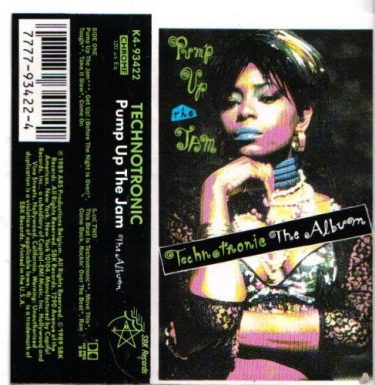 I was raised on Beach Boys, Beatles, ABBA, Led Zeppelin, and ’80s soft rock hits in that order. My father largely exposed me to the first three. My older sister Cami to Zeppelin. And my mother to the latter.
I was raised on Beach Boys, Beatles, ABBA, Led Zeppelin, and ’80s soft rock hits in that order. My father largely exposed me to the first three. My older sister Cami to Zeppelin. And my mother to the latter.
But it wasn’t until the spring of 1990, at the ripe age of 10, that I thought to myself, “I love this song, and I need to spend money on it to start my own music collection.”
The song was Technotronic’s “Pump Up The Jam,” which is a tasty mix of both hip-hop and house music. So on a visit to an Oklahoman Walmart with my mother, I forked over what I remember being around $8 for the album on cassette. I listened to that thing constantly while pretending to be Michael Jordan with my over the door basketball hoop.
Later that year, I was mesmerized by Metallica’s “Enter Sandman,” so I bought and devoured that album on cassette too. I don’t remember the third album I bought, but I remember borrowing and adoring my sister Summer’s Nirvana Nevermind CD on the regular.
From there my musical tastes traveled far and wide. With exception to select Nine In Nails songs, there are only two genres that I actively dislike: industrial and death metal. Everything else is fair game.
Readers: What was the first piece of music you bought for yourself?

An aspiring freelance writer recently emailed asking me how to increase her chances of placing articles with editors. She seemed eager to learn and willing to work, so this is what I told her:
- Keep your pitches (and requests in general) to a single paragraph. If you can’t sell a story or request for help in just a few sentences, you won’t be able to sell it in several paragraphs, which is annoying and disrespectful to an editor’s time. If they want more information, they’ll ask.
- Ask 100 editors if they’ll run your story. After most or all ignore you, ask them 3-4 times more. Often times it takes that much to get a favorable response, even after you get some good bylines under your belt. Usually I start by emailing my top 25 editors, and if no one bites, I’ll increase that number. But I didn’t place my first story with Wired Magazine until the 100th editor!
Lastly, I’d argue that most beginning writers struggle with wordiness. They like to hear themselves talk, and it shows in their bloated writing, which neither editors nor readers like. It sounds obvious, but to succeed as a freelance writer, you must be able to write in a way that appeals to a lot of other readers.
Think short sentences. Crystal clarity. Spicy words. Well-researched and genuine arguments. And in an increasingly distracted world, compelling writing requires more brevity than ever before.
Placing articles ain’t easy, but it’s totally worth it.

Courtesy Shutterstock
I was raised on the belief that few things are more American than protesting.
In high school, I successfully protested a high school teacher for saying that I had to stand for the Pledge of Allegiance. Although I was sitting out of laziness, as soon as she told me I “must stand,” I remained seated in legal defiance. The next day after my friend and I failed to stand, she sent us to the principal. After meeting with school officials, it was determined that students didn’t have to stand for the Pledge. So on the third day, our teacher humbly stood in front of our class and said she was wrong and apologized. From then on, my friend and I stood for the Pledge every single day with the utmost respect.
I felt a similar feeling of pride watching “reopen the economy” protesters this spring. I was saddened to them being shamed for protesting nationwide quarantines. There’s never a bad time to protest! If anything, lockdowns are the ideal time to protest.
Recently, I’ve felt equal amounts of pride watching “black lives matter” and “celebrate police” protests. Although seemingly on opposite ends of the political spectrum, I believe both are justified and honorable. As with all complicated issues in life, the truth is somewhere in the middle. Cops are sometimes brutally and deathly racists, and we should try to fix that. But mostly they are good, and they should still be celebrated. Continue reading…
 Earlier this month, I received one of the nicest reader emails ever. With his permission (and edited for clarity), I share the letter in the hopes that it might inspire someone else:
Earlier this month, I received one of the nicest reader emails ever. With his permission (and edited for clarity), I share the letter in the hopes that it might inspire someone else:
Hi Blake. I want to let you know how great an impact your book Log Off had on my life.
You see, I was overwhelmed, unable to focus, distracted, and constantly tired. I kind of knew the source of it all, but was unable to express it, even to myself. Now, thanks to you, I have changed my relationship with technology, and my life is increasingly better.
A few things about me: my name is Mauricio Munoz. I am 48 year-old dentist from Bogota, Colombia. I love technology. I really like the internet and all the possibilities and access to information and communication that it entails.
I love devices like smartphones, but I realized, after reading your book, that I was addicted to those things. I was completely dominated by the dopamine fix that those devices and connectivity gave me. Now I feel much better. Thanks a lot, man.
Here are some major changes I’ve made:
- Now I use a dumb phone. My office has a smartphone managed by my staff, but it’s only used for business.
- I do own a smartphone, but I use it with no sim card. Like a tablet mostly for online banking, communication with family overseas, and for its very good camera. But I don’t carry it with me all the time, and sometimes I don’t use it at all for weeks.
- I still use a first-generation iPad for reading books.
- I have other laptops and desktops around, but I only use those on a need-to basis now.
- I enjoy my free time with my family and myself more. I like my work more, too, and feel more present in every moment.
Thanks, Blake. Great work—your book changed my life.
Mauricio, muchas gracias for reading my book and saying so. I’m thrilled it had a positive impact and am humbled by your kind words. I hope to shake your hand in Bogota someday.

Courtesy Blake Snow
Here’s my latest travel dispatch for Lonely Planet
Depending on where you live, amusement parks can be one of the best day trip experiences around. But like everything else, coronavirus indefinitely changed them.
As one of the US states with the lowest rates of coronavirus infections, Utah was also one of the first to lift restrictions and open its doors. In late May, one of those doors was the highly-rated Lagoon Park, which USA Today recently named one of the best “hidden-gem” theme parks in the country.
Local reaction to the park’s reopening was tepid at best. Is a tightly packed, and line-filled attraction really such a good idea, especially after over two months of quarantine? At first my wife and I said no. But after reading favorable reports of “no crowds,” “attendance limited to 15% capacity,” and “we had a lot of fun,” – not to mention almost no getaway options at our disposal (even Utah’s national parks still hadn’t yet opened) – we booked our family for the following Saturday. Continue reading…
 My wife started and runs a successful soccer club of 14 youth teams. Now in their second year, they’ve done really well because they charge little more than recreational fees for a league that’s a lot more competitive, without the expensive time and money commitments of “club soccer.”
My wife started and runs a successful soccer club of 14 youth teams. Now in their second year, they’ve done really well because they charge little more than recreational fees for a league that’s a lot more competitive, without the expensive time and money commitments of “club soccer.”
After opening registration this summer, she had more than enough players sign up. That’s what you get when you run a well-organized event with lots of value. Last week, however, she received a long-winded email from a demanding mother that listed out several line items she required before registration. She went on and on, my wife said.
In response, my wife kindly but briefly wrote, “Thanks for asking. We’re full this year. Please consider us again.”
My wife instinctively understood that this woman might cause more headaches than her $200 registration fee was worth.
The same is true of any business. If someone seems like they’d be a difficult customer, they probably will be and should best be avoided through a polite “No thanks,” or “I’m busy.”
In rare cases where you provide a custom quote, you might try to “price them out,” that is only work with them for an amount that you estimate would be worth the added headaches.
Both approaches have served me well and really help the free market shine, for sellers as much as buyers.
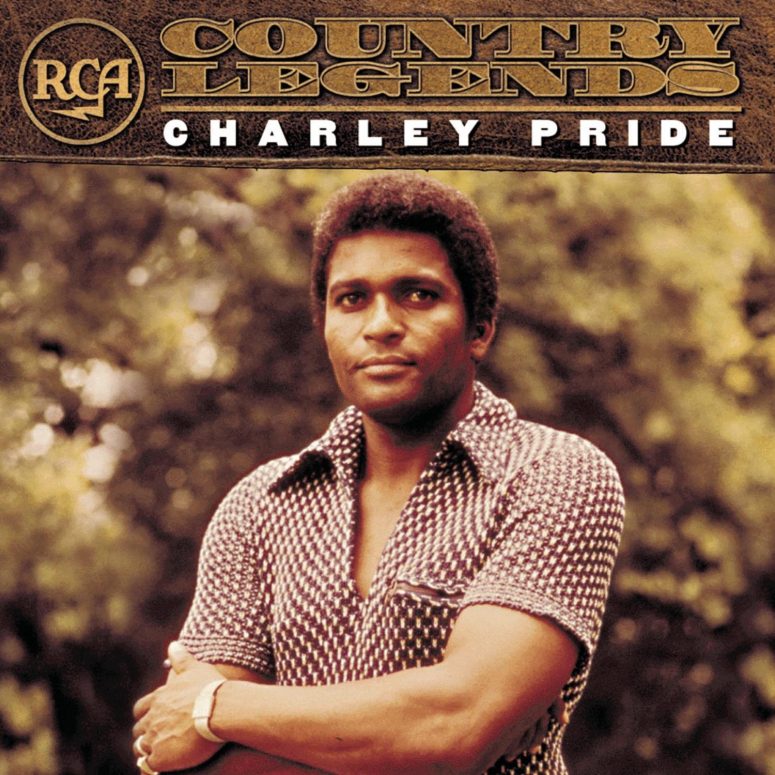
During the Great Depression, a man named Charley Pride was born in Mississippi as one of 11 children to his sharecropping parents. The year he was born, The Dust Bowl would ravage 300 million American acres, forcing hundreds of thousands of migrants to California in search of income.
As a boy, Pride was introduced to country music by his father and later learned guitar. Though he loved music, he dreamed of playing professional baseball, which he successfully did for much of his 20s in both Negro and minor leagues. After being cut by the Cincinnati Reds farm team in Missoula, Montana, Pride worked in construction and a metal factory for many years. He also played semi-pro ball on the side and made double his salary by singing to the crowd before games. Years later he cut a demo at the famous Sun Studio in Memphis, the same recording studio that put Elvis on the map. Sometime later, country superstar Chet Atkins heard the demo and signed him to a contract. With over 30 number one hits, he would become the second most successful RCA musician in history (after Elvis).
But fame quickly forced him to confront his outsider status. This is how he confronted it, according to Wikipedia. “In the late summer of 1966, on the strength of his early releases, Pride was booked for his first large show, in Detroit’s Olympia Stadium. Since no biographical information had been included with his songs, few of the 10,000 country fans who came to the show knew Pride was black, and only discovered the fact when he walked onto the stage, at which point the applause trickled off to silence. “I knew I’d have to get it over with sooner or later,” Pride later remembered. “I told the audience: ‘Friends, I realize it’s a little unique, me coming out here—with a permanent suntan—to sing country and western to you. But that’s the way it is.’ ”
I love that quote as much as I love Pride’s music and character. This is my favorite song of his.
 Days before America went on coronavirus quarantine this spring, Time Magazine published an excellent report on why Asian countries wear masks and Americans (up until that point) didn’t. The reason? There is little scientific evidence showing that masks actually work in preventing non-airborn illness such as the flu, common cold, and coronavirus from spreading. Earlier this year, the New York Times published a similar report showing dubious benefits, if any.
Days before America went on coronavirus quarantine this spring, Time Magazine published an excellent report on why Asian countries wear masks and Americans (up until that point) didn’t. The reason? There is little scientific evidence showing that masks actually work in preventing non-airborn illness such as the flu, common cold, and coronavirus from spreading. Earlier this year, the New York Times published a similar report showing dubious benefits, if any.
In light of that lack of evidence after decades of research, American health officials basically took the stance of, “If it ain’t proven to work, don’t do it.” They kept this stance until early April, when the CDC and WHO superstitiously started recommended them. Not because there were suddenly lots of scientific studies showing that masks actually work (there weren’t). Rather, when dealing with something that’s new and mysterious, humans understandably resort to “doesn’t hurt to try” approaches.
Only in this case, it does hurt to try. Here’s why well-intentioned but “false sense of security” health masks aren’t worth the hassle in the fight against coronavirus: Continue reading…
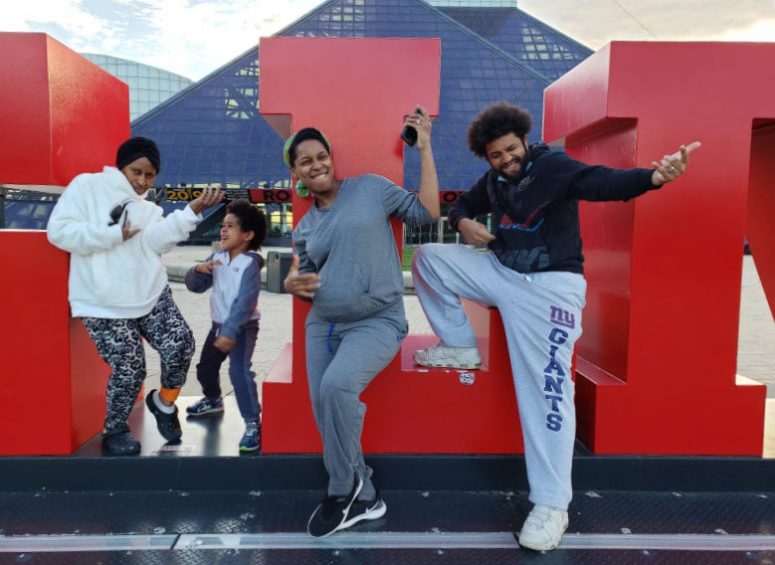
Courtesy Janine Rubenstein
Read and enjoyed this adventurous story by Janine Rubenstein this week:
I found a site called RVShare.com, which is basically AirBnB for motor homes. Unsurprisingly, you could count on zero hands the amount of Black RV owners I spotted on there. But I stumbled upon the nicest guy renting out the perfect first-timer van: a Class A, 2016 Ford Thor Vegas, measuring in at 24ft. “It drives just like a big SUV” he told me, which helped calm my nerves about how my brother and husband would be able to maneuver the thing.
Pretty sure it’s the first article I’ve ever read in Essence and hope it’s yours too if you’re never read the magazine before.

There are a lot of things I miss since coronavirus scared, scarred, and upended the world.
I miss the large number of people I used to freely associate with. I miss seeing the bottom half of people’s faces. I miss the wonderful customer service we used to receive from restaurants and other stores. I miss a normal workload.
I miss live events, especially sports, music, and movie theaters. I miss roaming about my city, country, and world in what was surely the heyday of global travel. I miss knowing that I could shake hands or high-five anyone I encountered. I miss the trust we used to have in immune systems, the ones that largely kept our species alive for hundreds of thousands of years.
But mostly, I miss being treated like a trustworthy human instead of a disease-carrying leper that should be avoided. That’s a gross feeling to confront on a near daily basis.
That said, I couldn’t have stomached and mostly thrived over the last three months had it not been for the following: Continue reading…

Wikimedia Commons
PROVO, Ut. — Want to get ahead in this world? Work lots of extra hours — even nights and weekends — experts say, and it will all be worth your while.
“It’s easy to forget what’s most important in life,” says Bill Loney, a certified life coach who hasn’t quite made it in life yet. “Family, friends, and social activities that can often inspire and enrich the life of an individual… these are all distractions in getting more work done,” he adds.
Emma Royds, who hasn’t stopped looking at her smartphone every five minutes for three straight years, councils that most people actually die wishing they had spent more time — not less — working. “People never regret working too much,” she says. “My neighbor opted to do adventurous, social, and fitness-related activities with family and friends in his spare time.
“Now 80, he told me recently he really wishes he would have spent more time on TPS cover sheets, obsessively trying to turn his company into the next big thing, and reading email during every waking hour of his life. It’s kind of sad, really.” Continue reading…
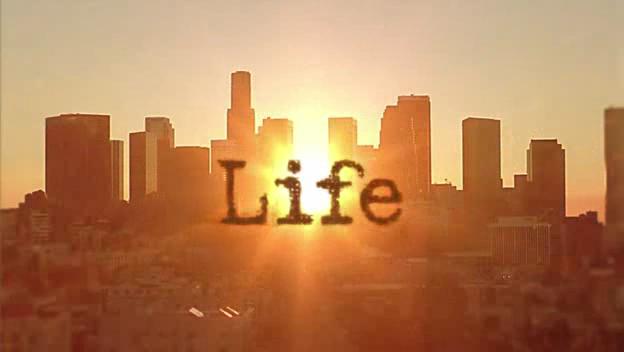
Here’s some scientifically tabulated advice. They’re called the top five regrets of the dying. In short, a nurse that took care of lots of people on their deathbeds asked and recorded their most common regrets. They are as follows, along with my pithy commentary: Continue reading…
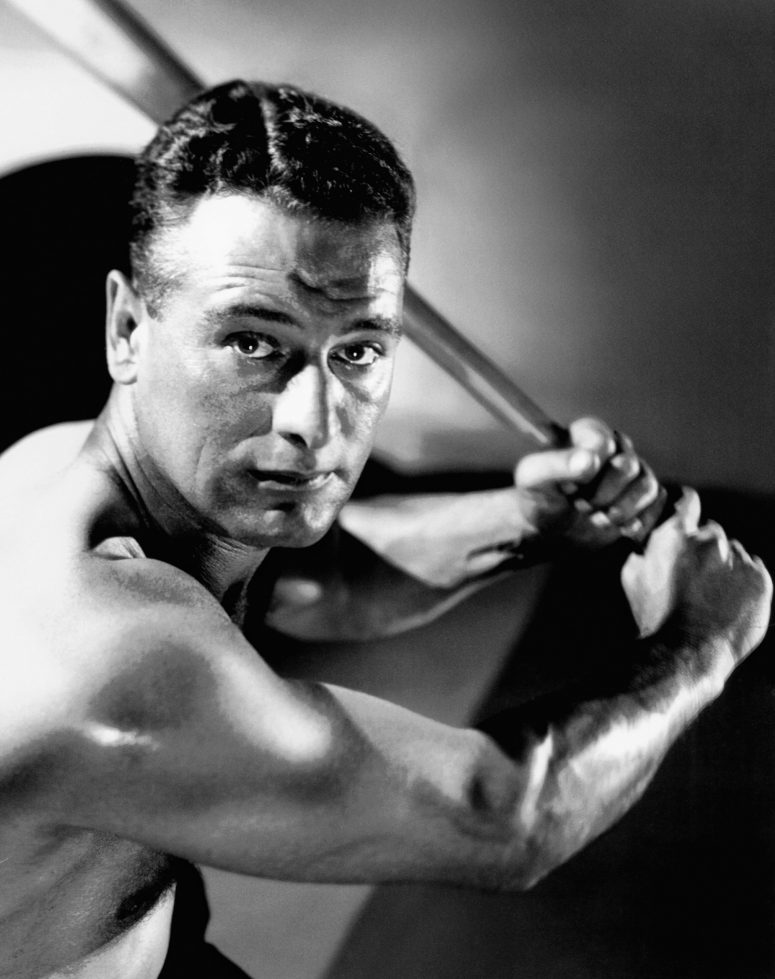
This is a fantastic long-read by Louis Menand about how baseball players turned athletes into the sponsored celebrities we know them as today. “He signed his first client in 1921. And that client turned out to be the greatest sports figure of his day, or possibly, with the exception of Muhammad Ali, of any day: Babe Ruth. Ruth didn’t just do what every ballplayer did but better. On the field and off, he was in a class by himself.”
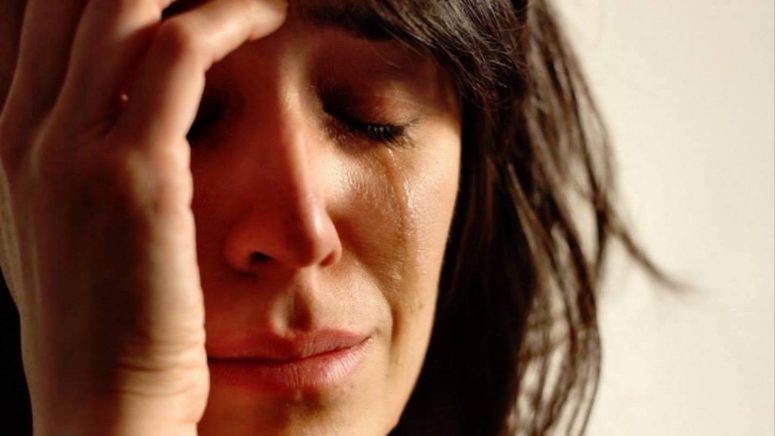
Knowing the 5 love languages has greatly improved my marriage and other relationships. Since first being introduced to it many years ago, my wife and I have significantly enhanced our communication.
I didn’t learn about the 6 love busters until last night, however, while attending a local charity meeting. They are as follows: Continue reading…
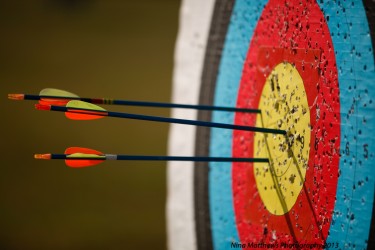
Nina Matthews
If you insist on setting 5, 10, or 30 year goals in life, you’re gonna have a bad time.
The reason: Long-terms goals are mostly arbitrary and futile. Since life is full of surprise, setting specific expectations for it largely results in a feeling of failure.
In other words, “Don’t aim at success,” writes Viktor Frankl in his seminal Man’s Search For Meaning. “The more you aim at it and make it a target, the more you are going to miss it.”
This has certainly been the case in my life. Continue reading…
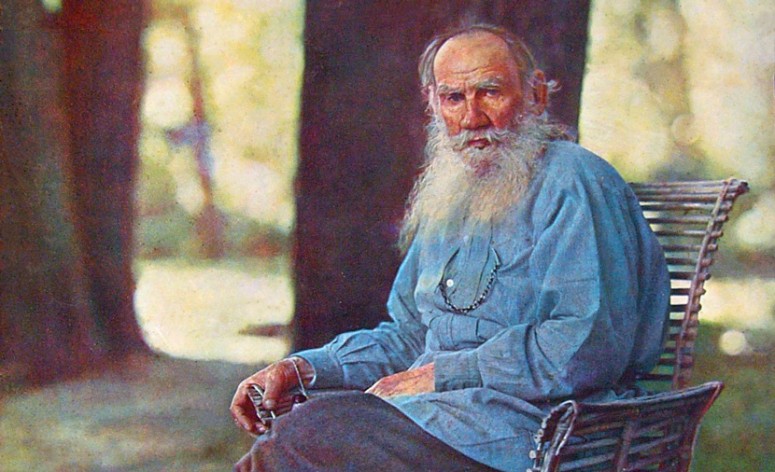
Leo Tolstoy courtesy Wikimedia Commons
This issue of the Offline Newsletter is brought to you by Leo Tolstoy.
It once occurred to a certain king, that if he always knew the right time to begin everything; if he knew who were the right people to listen to, and whom to avoid; and, above all, if he always knew what was the most important thing to do, he would never fail in anything he might undertake.
And this thought having occurred to him, he had it proclaimed throughout his kingdom that he would give a great reward to any one who would teach him what was the right time for every action, and who were the most necessary people, and how he might know what was the most important thing to do.
Several learned men came to the King, but they all answered his questions differently (e.g. advance planning, multi-tasking, mentoring, high-ranking people, science, warfare, religion).
All the answers being different, the King agreed with none of them, and gave the reward to none. But still wishing to find the right answers to his questions, he decided to consult a hermit, widely renowned for his wisdom. Continue reading…
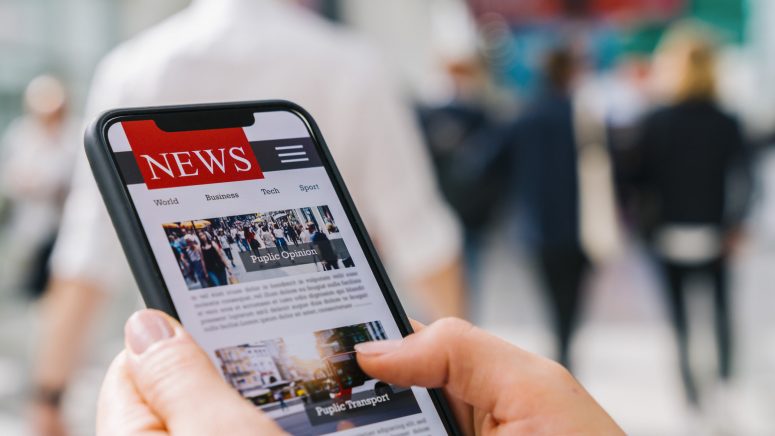
Courtesy Shutterstock
I start many of my conversations with the following: “I read an interesting article recently…” This week my twelve-year old daughter asked, “Dad, where do you read all these articles you’re talking about?”
Good question. In essence, she was asking how I stay informed and uncover a lot of interesting information and in-depth news. This is what I told her:
- I read three daily newspapers. They are: USA Today (for national news) and KSL and Daily Herald (for local news). I only scan the homepages and click on headlines that interest me. I sometimes skip weekends and weekdays on extra busy days. All told, I might spend 10-20 minutes reading these. I rarely read politics.
- I read Digg’s daily long reads. These are editor picks of some of the best long-form journalism and magazine articles on the web, from a variety of outlets. I stockpile them in several open tabs on my phone and read them throughout the week, spending a few hours doing so.
- I subscribe to weekly long read newsletters. They are the Weekly Top 5 Longreads and Longform’s Pick of The Week. Like Digg Longreads, I stockpile these and spend a few hours reading them each week.
On top of that, I read about 8-10 books a year, mostly non-fiction and biographies.
Fun fact: I used to spend a lot more time staying informed and reading dozens of websites and online newspapers in my twenties but have found since my thirties that the added distraction didn’t justify the amount of time I was spending. Since then, I’ve been a lot more productive and happy while still staying just as informed on the low-caloric, but nutrient-rich diet of the above.
Hope that helps.

Credit: Blake Snow
My wife and I believe the world is inherently good and we want to indoctrinate our children to think the same. Not by ignoring society’s seedy underbelly. But with measurable evidence such as this that overwhelmingly proves the world is getting better and better.
To that end, my wife shared the following quote with our children and I over breakfast recently: “Feed your faith and your fear will starve.” In other words, people who are afraid are usually consumed by doubt.
But in my experience, we can replace that fear and doubt with hope and love by doing the following: Continue reading…
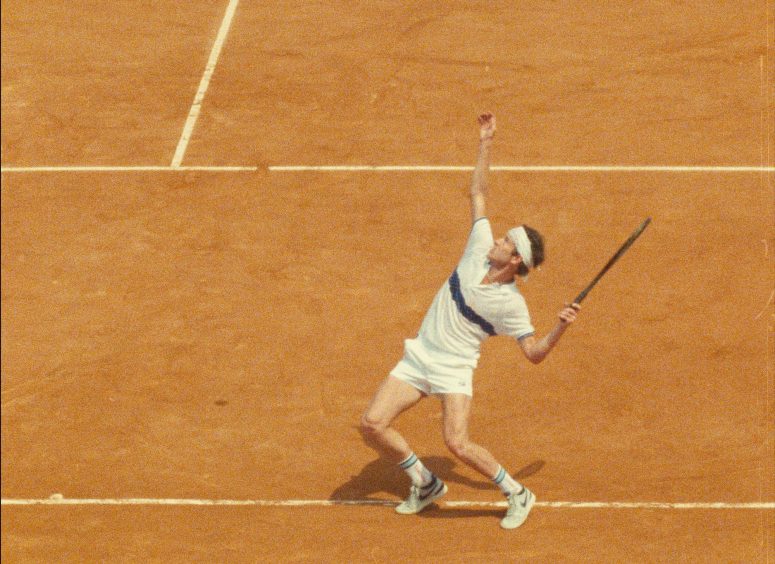
Years ago I read one of the greatest sports biographies ever: You Cannot Be Serious by John McEnroe. You should read it.
Last week I watched one of the best sports documentaries I’ve ever seen: John McEnroe: In The Realm of Perfection.
Now before you write me off as a McEnroe fanboy, which I unabashedly am, please know that the latter is a French documentary about a controversial American tennis brat in his prime.
Shot mostly in slow motion, it is a quirky and mesmerizing film with a powerful finish that convincingly argues that a tennis match is good cinema, and that McEnroe was arguably the sports best “directors” of tennis cinema.
Four stars out of five.
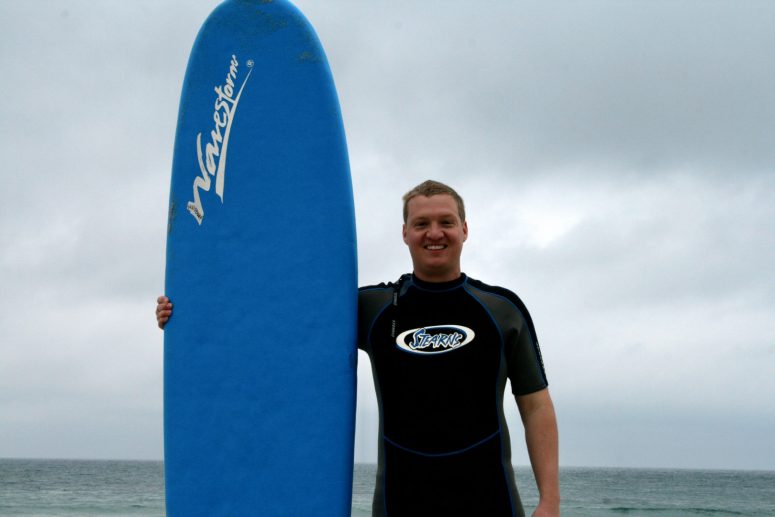
My first time surfing (in San Diego): What I looked like days after quitting Facebook
10 years ago to the day, I quit Facebook. At the time I feared I might be committing social suicide. Today, I can happily report that didn’t happen.
Since quitting the popular boomer hangout, I’ve limited the number of work and out of office distractions I encounter. I no longer feel the desire to “check in” online at every waking hour. It takes me longer to discover new bands. And I don’t have to consciously decide or distinguish friends from colleagues, associates, and nobodies. I just let them happen naturally now; unannounced and always evolving.
Continue reading…
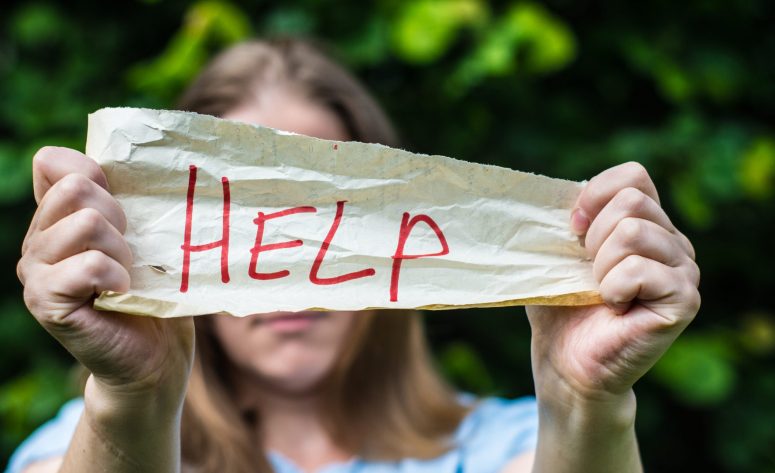
Courtesy Shutterstock
My daughter taught, if not reminded, me of an important lesson last week.
While driving home after dropping off one of her applications, I saw a homeless woman on the corner. At first glance, she looked like she might have been high or intoxicated, so I quickly drove past. Upon second thought, I turned to my kiddo and asked, “Do you think we should give our blessing bags (that we keep in the car) to homeless people that look high or might not benefit as much from them?” After a moment, Sadie plainly answered, “Dad, I don’t think we should ever judge a book by their cover.”
Of course she was right, so I quickly responded by turning around and driving back to the spot where the woman was standing. I handed Sadie a bag from the back of the truck. She rolled down the window to the approaching woman. “Here you go,” the former said to the latter.
It was dark outside but the street lamp was bright enough to reveal a woman with lively eyes, a completely sober demeanor, and a bright, appreciative smile. I felt warm inside and was proud of the example that my 14 year old had shown.
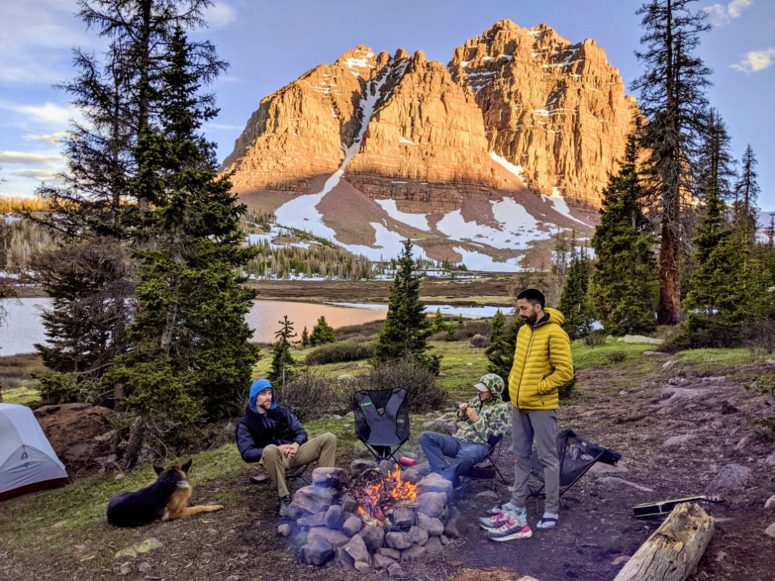
Credit: Blake Snow
This wasn’t the first time I’ve written about my favorite, lesser-known Utah outdoors. And it probably won’t be the last. Hope you enjoy.
Utah has some of the most beautiful national parks in the United States, if not North America as a whole. Because of this, numerous state parks and other protected lands are often forgotten; many would likely have national park status were they not located somewhere that already has five. Read on to learn about one of Utah’s best kept secrets. Continue reading on Lonely Planet…
See also: Which Utah park is right for you?
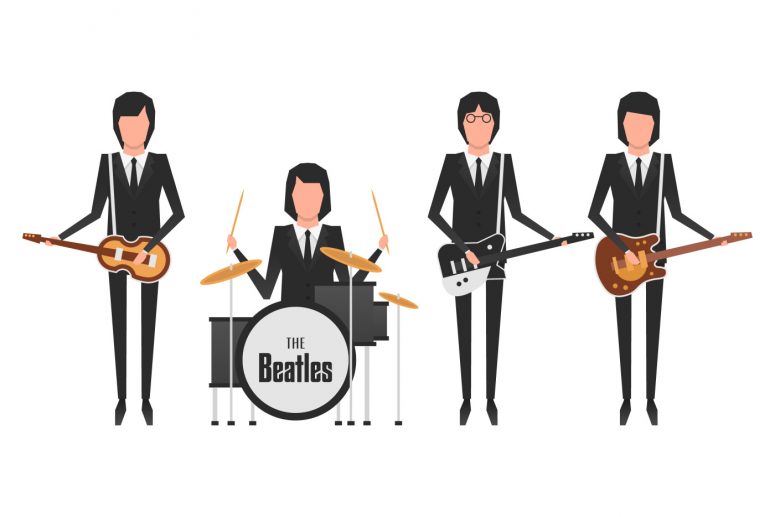
Courtesy Shutterstock
Because I have a lot of extra free time in a partially paused world, I decided to re-listen to the entire Beatles catalog this weekend (well over 10 hours worth!) to determine my favorite albums.
Although I regularly feasted on The Fab Four in high school, college, and into my late twenties, I haven’t listened to their music much in the last decade. Not that I no longer like or respect it. Only that I probably overplayed it to the point of boredom.
After my weekend binge, however, I reconfirmed my belief that The Beatles are the greatest pop band ever—ahead of only Elvis and Michael Jackson in terms of the shear number of songs I enjoy. Either way, this is what I learned from my quarantine experiment: Continue reading…
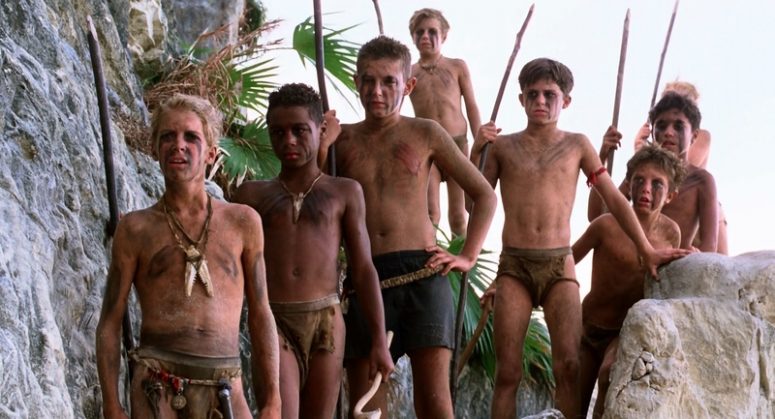
Courtesy Columbia Pictures
Lord of the Flies by EL Epstein was one of my favorite books I read in my adolescence. It’s shocking, sad, and discouraging.
It’s also entirely made up and based on the fear-mongering belief that humans will basically eat each other when the going gets rough. Many humans often think like that in times of uncertainty—global quarantines very much included.
But “it’s time we told a different kind of story,” argues Rutger Bregman, who researched the reality of shipwrecked isolation and found that the vast majority of evidence suggests that adolescent boys would act very differently. In fact, they would largely cooperate and thrive instead of succumbing to war, murder, and anarchy.
“Readers were still skeptical,” Bregman reported, however. So he searched high and low for a real-life example of what shipwrecked boys might actually do. After sleuthing on the internet, he discovered a story of six boys from Tonga in 1965 who were shipwrecked on a Polynesian island for 15 months. He went and visited one of the survivors and heard a detailed and inspiring true story. The short of it: when the boys were finally rescued by a passing ship on September 11, 1966, a physician was “astonished by their mulled physiques” and overall health.
“The real Lord of the Flies is a tale of friendship and loyalty,” Bregman concludes. “One that illustrates how much stronger we are if we can lean on each other.”
Need more proof? Look how far humanity has come over the last 2000, 200, 100, or even 10 years! If the haters, pessimists, and naysayers were actually right, we would have all died along time ago. 💪

You can listen to the 17 minute episode here. Thanks for having me, Jordan.
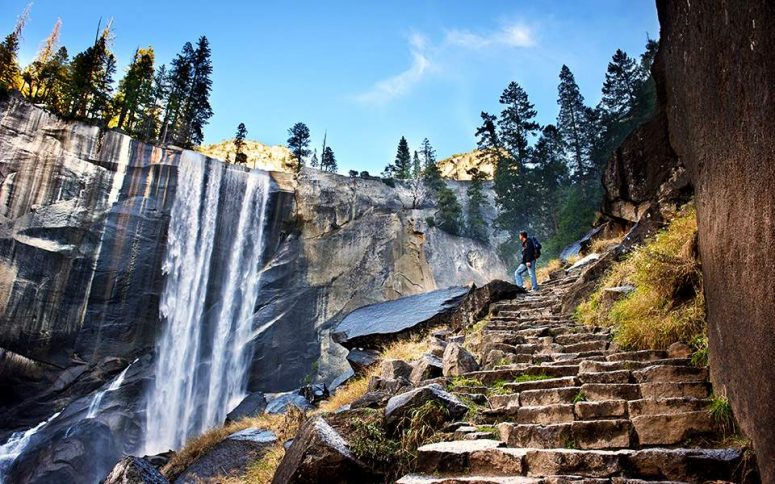
Courtesy Shutterstock
Thanks for reading and sharing any of the below:
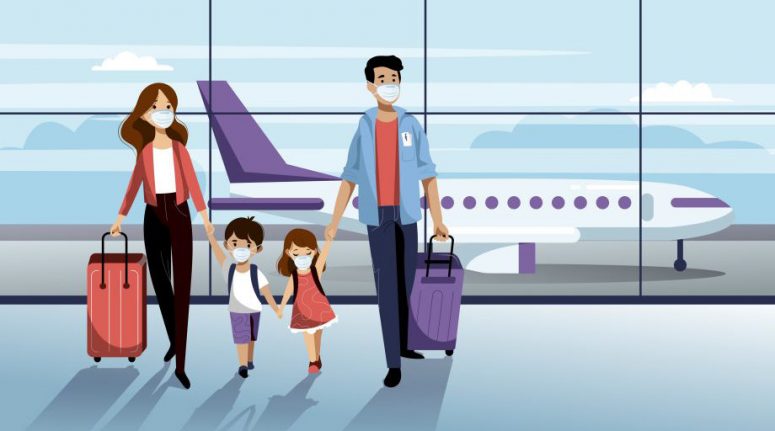
Courtesy Shutterstock
My latest for Lonely Planet: If you’re hoping that travel will return to normal in 2020, don’t hold your breath, experts say. That said, you will likely be able to vacation on a reduced basis later this year, if not by summer, some believe. Although not ideal, that’s better than the “do not travel” orders the world has endured since March.
So what might a travel reopening look like?
“The travel industry is a huge part of the economic health of so many countries, so I imagine by the end of the summer tourism will begin again,” says Jorge Branco, director of the World Travelers Association. “I don’t think schedules will be as they were pre-coronavirus right away, but there will be options available to begin the transition.”
In other words, we won’t hit the “on” switch as quickly as we hit the “off” switch. Rather, governments, health experts and tourism providers will metaphorically install “dimmers” to gradually increase lifestyles and travel to normal levels.
Continue reading on Lonely Planet…

I wish coronavirus never happened. Given its uncertainty, I also wish society would have partially distanced like Sweden did instead of hitting the giant “off” switch on social life or “save hospital capacities at all costs” approach the rest of us took.
It’s a fearful world we live in.
That said, I’ve been able to take the lemons, if you will, to make some sweet lemonade recently. Although I was an angry, stressed-out wreck the first two weeks of quarantine, I’ve been able to transition to first coping and eventually thriving over the last month.
Here’s how the unwelcome outbreak and draconian quarantine have actually changed my life for the better: Continue reading…
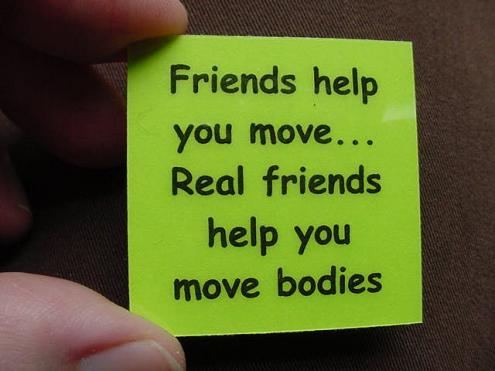
Lindsey and I have been blessed with many genuine friends — ones that make us laugh, can celebrate our accomplishments, and extend considerate help.
This week, while visiting one such family, we discovered that they’ve been dealing with some “friends” that reputedly became envious and judgmental of our friends’ recent good fortune. This saddened me. Time is too precious to waste on such superficial friends.
With that in mind, here’s my proven guide to ditching and avoiding fake friends, so you can better enjoy your days in the sun. Continue reading…

Courtesy lassedesignen/Shutterstock
I’m convinced there are two types of creators in this world: genius ones and everybody else. By my estimation, 99% of us fall into the latter category, myself very much included. As such, we must play by different rules. Continue reading…

I took this picture of my front yard this week—one of the prettiest springs I’ve seen in years. Thankfully quarantines didn’t cancel that.
Life goes on. 🌻
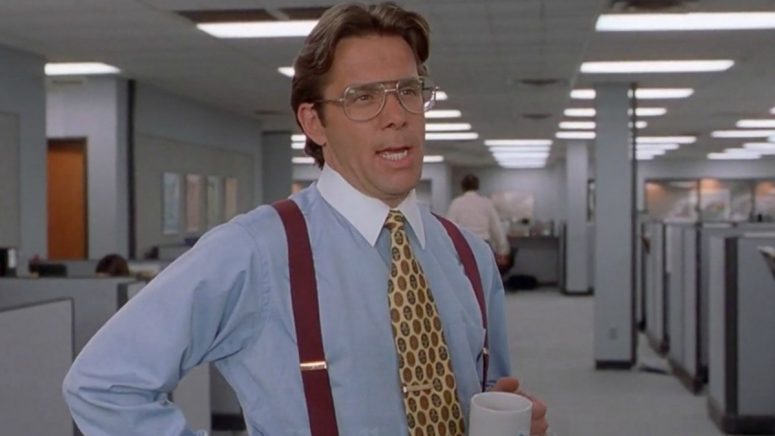
I graduated from college at a time when “Casual Fridays” were a thing. This was before Silicon Valley established the “casual everydays” that most offices now enjoy—hoodies, jeans, t-shirts, and even activewear and joggers in some cases.
As a senior, I was invited to interview with a large national company that was coming to campus. I wasn’t particularly fond of the company, but I was flattered they had reviewed my resume and wanted to speak to me (after graduating, I would forgo employment altogether to work for myself, but that’s another story).
When the interview time came, I entered a designated office on campus and met a recruiter in his mid 40s under drab fluorescent lighting. He didn’t look particularly happy. In fact, he looked rather miserable. Obviously would rather be home with his family than interviewing some undergrad like me in some far away city. Continue reading…
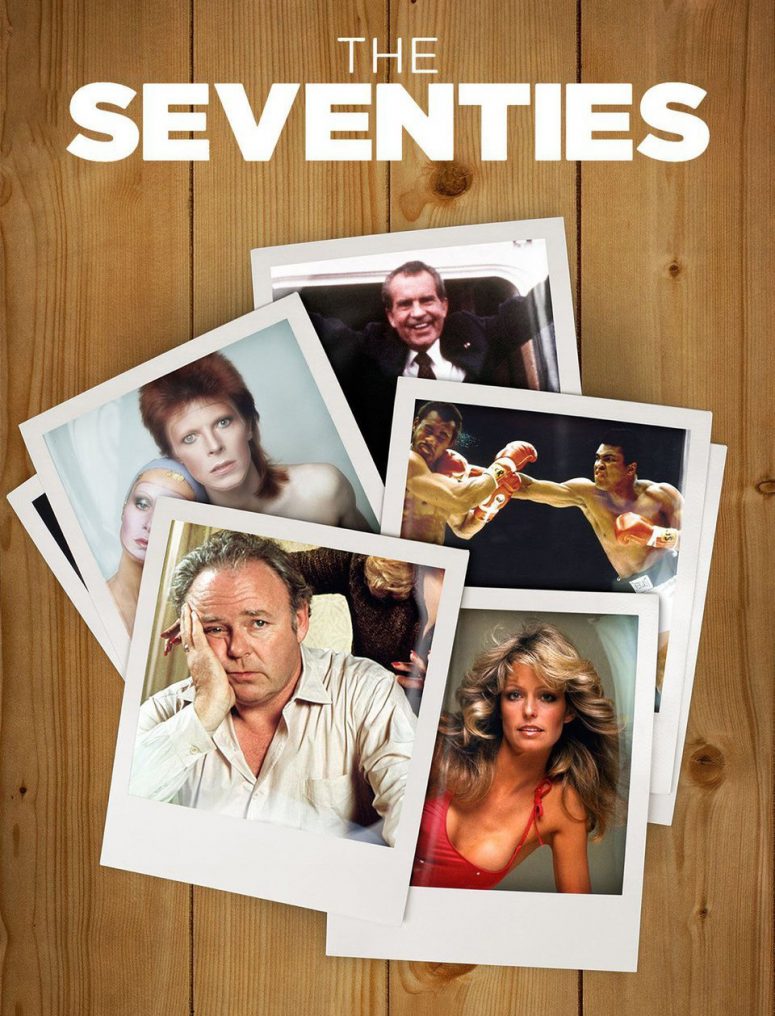
The following description by Glenn Colehamer of California is as fascinating as it is relevant.
I was a college junior at the dawn of the 1970’s. Here’s what I remember during that remarkable fascinating decade, both great and not so great:
Cigarette butts on the ground everywhere people went. Ash trays everywhere.
Peace symbols as graffiti everywhere you looked.
Long hair on men everywhere you looked.
Free sex, no AIDS, no herpes, no condoms. Antibiotics reliably cured most venereal diseases.
Youthful baby boomers everywhere.
Muscle cars everywhere. VW bugs in your way everywhere. VW vans owned by hippies everywhere. Curtains covered all the side and rear windows. We knew why. Continue reading…
 I’ve written thousands of articles since becoming a full time writer 15 years ago. But I’m especially proud of these:
I’ve written thousands of articles since becoming a full time writer 15 years ago. But I’m especially proud of these:
- Log Off, my first book
- My best feature stories
- My best travel columns
- My best personal blogs
- My favorite people in the world
Thanks for reading. I wouldn’t be a writer if it wasn’t for readers.
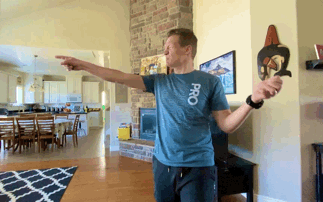
With a lot fewer distractions in quarantine, I’ve recorded more music in the last two weeks than I have in years. I even started playing with a local guitarist in the hopes of starting a band. 🤘
Until then, I wanted to share some of the things I’ve recorded recently, in addition to some of my all-time favorite recordings. They are as follows (click to play):
- “Girlfriends” (The Academic cover). I love this pop song and just had to record it. I sang and played the guitars and tambourine.
- “Another One” (Mac DeMarco cover). I ripped the piano chords from YouTube and sung the lyrics to one of my favorite songs written by my new favorite artist.
- “Internet” (Post Malone cover). I played guitar and sang a mostly clean version of this song, with exception to one emotional outburst that I just had to sing in this crazy world right now.
- “The Promise” (When in Rome cover). I played piano, guitar, and sang both harmonies. This is one of my all-time favorite ’80s songs. I don’t love the piano tone, but I’m proud of the result.
- “Different” (original). A song I wrote, sung, and played while living in Brazil. It’s about changing for the better.
- The God of Abraham Praise. If you’re looking for a spiritual track, try this one. I sang the choir parts over a radical organ I found on YouTube. This is one of my favorite hymns, which was converted from an old Jewish song in the 1700s.
- “1901” (Phoenix cover). I played guitar and sung one of my favorite upbeat alternative songs.
- “Last Time” (original song). An early aught pop song I wrote with my friend Dylan Denny. I sung, played drums, and lead guitar.
- “Best Foot Forward” (original song). Another upbeat song I produced and sung with my friend Dylan.
- “The Deepest Sleep Ever” (original instrumental). I’ve written and produced a lot of instrumental music over the years, and this is one of my absolute favorites.
- “Abstract Consensus” (original instrumental). Recorded in 2002 with over 75 samples, this is probably the best dance song I’ve ever written.
- “System Sound” (original song). Ever wanted to hear me rap, albeit not very good? Well now’s your chance! I wrote, produced, and rapped this song in the summer of 2001.
- “Stay” (U2 cover). Probably one of the best recordings I’ve ever made. I played guitar and sang.
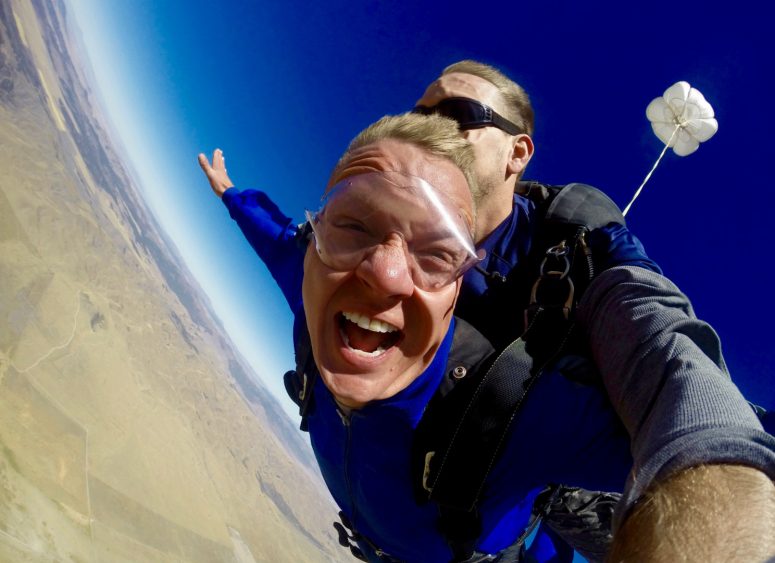
It only took me a few minutes to fall 10,000 feet, but I didn’t really come down for another couple of hours. That’s the best way to describe my first time skydiving. That and recognizing it as one of the greatest physiological sensations I’ve ever endeavored.
On a royal blue morning recently, I drove forty minutes south of my home to Skydive the Wasatch in Nephi, Utah. I was greeted by Andrew the drop manager, Jordan my instructor (or more accurately the person I’d strap my life to), and Joel the pilot.
Free snacks, a row of leather sofas, and caffeinated drinks lined the open hanger in an effort to ease or at least distract the nerves of would-be jumpers. Just outside, an old Cessna plane came to life to take a woman in her forties and her friend in her twenties on their first and second respective dives. While waiting for their quick return, I signed and initialed the longest waiver I’ve ever seen without reading a single line of legalese.
“Are you ready?” Jordan asked with a friendly smile. I honestly answered in the affirmative, and then he explained the safety and protocol procedures. “The whole experience takes about 25 minutes,” he said. “Twenty minutes to climb, around half of minute to free-fall, and three or four more to parachute down.” Continue reading…
 This is what old people talk about over lunch: how degenerate youth no longer use capitals and punctuation when writing. At least that’s what I did over lunch today with a few middle aged friends.
This is what old people talk about over lunch: how degenerate youth no longer use capitals and punctuation when writing. At least that’s what I did over lunch today with a few middle aged friends.
This is especially important to me because I’m in the business of selling clear writing. Having done so for many years, this much I know: the clearer you write, the better chance you have of avoiding confusion and getting what you want.
A few years ago, a recent college graduate and aspiring writer emailed me to ask for help in getting a job. He used no capitals, punctuation, paragraphs—let alone line breaks. It was just one huge blob of text. Continue reading…
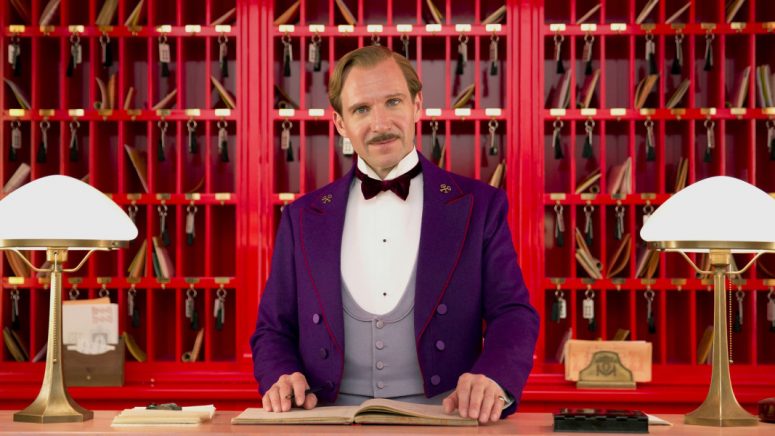
What do Indiana Jones, Little Miss Sunshine, Secret Life of Walter Mitty, Darjeeling Unlimited, and Endless Summer have in common? They’re among the very best feature films that make you want to go places. So before streaming your next great home movie, consider one of these first: Continue reading…
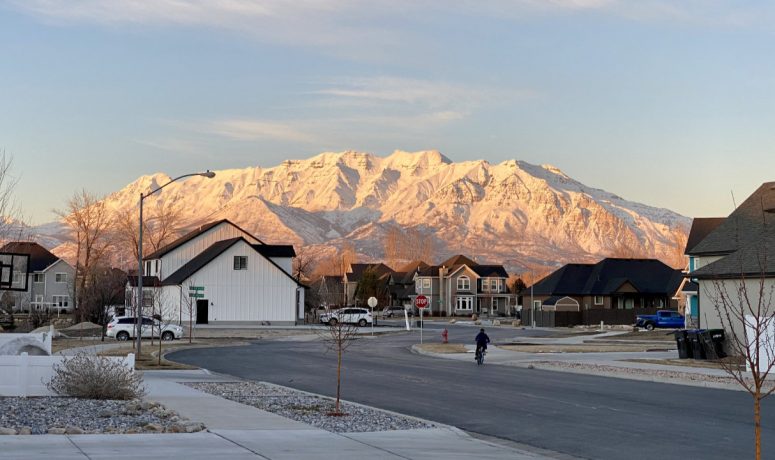
Photo: Blake Snow
I recently started reading The Nature Fix by Florence Williams.
In her introduction, Williams reports that most empirical evidence suggests there are four ingredients for happiness, namely feeling enmeshed in a community of healthy friendships (i.e. “it takes a village”), having your basic survival needs met, keeping your brain stimulated and engaged, and working for something that’s larger than yourself.
There’s increasing evidence, however, for a fifth ingredient, Williams argues: Regular outdoors, getting outside, or “forest bathing.”
I certainly won’t argue with any of those. Surrounding myself with healthy relationships, having my basic needs met, keeping my brain stimulated through learning and interesting work, volunteering, and staying outdoors has done the trick for me.
Easier said than done. But when you break it down like that, it also seems highly attainable.






 If you enjoy the effort of doing something more than the result, you will be good at whatever you decide to do.
If you enjoy the effort of doing something more than the result, you will be good at whatever you decide to do.
 With little else to do in quarantine, I’ve been making a lot of music over the last four months. I’ve recorded an album’s worth of original material, which I hope to release this summer, and started rehearsing with a live cover band—a rock quartet comprised of me singing, Ashton Bennett melting faces on guitar, Caleb Browning rocking a ridiculous amount of bass and backing vocals, and Jayce Ward not missing a beat on drums. (
With little else to do in quarantine, I’ve been making a lot of music over the last four months. I’ve recorded an album’s worth of original material, which I hope to release this summer, and started rehearsing with a live cover band—a rock quartet comprised of me singing, Ashton Bennett melting faces on guitar, Caleb Browning rocking a ridiculous amount of bass and backing vocals, and Jayce Ward not missing a beat on drums. (




 Earlier this month, I received one of the nicest reader emails ever. With his permission (and edited for clarity), I share the letter in the hopes that it might inspire someone else:
Earlier this month, I received one of the nicest reader emails ever. With his permission (and edited for clarity), I share the letter in the hopes that it might inspire someone else:


 Days before America went on coronavirus quarantine this spring, Time Magazine
Days before America went on coronavirus quarantine this spring, Time Magazine 
























 I’ve written thousands of articles since becoming a full time writer 15 years ago. But I’m especially proud of these:
I’ve written thousands of articles since becoming a full time writer 15 years ago. But I’m especially proud of these:

 This is what old people talk about over lunch: how degenerate youth no longer use capitals and punctuation when writing. At least that’s what I did over lunch today with a few middle aged friends.
This is what old people talk about over lunch: how degenerate youth no longer use capitals and punctuation when writing. At least that’s what I did over lunch today with a few middle aged friends.
